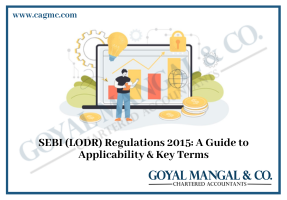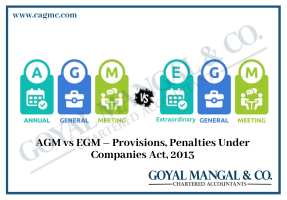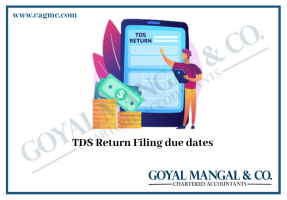 Auditing is an important function for any company that wants to operate within the ambit of law. Auditors help to ensure that company operations are in compliance to applicable laws and regulations, and also identifies potential risks, and recommend corrective actions if necessary. Illegal use of digital technology to commit fraud or other illegal activities will be termed as Digital Fraud. For example, activities such as Identity theft, Phishing, malware attacks. This article briefly describes the Challenges for Auditor under Digital Era, & Role of Auditor as per Company Laws in India.
Auditing is an important function for any company that wants to operate within the ambit of law. Auditors help to ensure that company operations are in compliance to applicable laws and regulations, and also identifies potential risks, and recommend corrective actions if necessary. Illegal use of digital technology to commit fraud or other illegal activities will be termed as Digital Fraud. For example, activities such as Identity theft, Phishing, malware attacks. This article briefly describes the Challenges for Auditor under Digital Era, & Role of Auditor as per Company Laws in India.
|
Table of Content |
Quick Look
As technology continues to advance rapidly, the business environment has become increasingly digitized. In the current digital era, most businesses rely on various digital tools and systems to manage their operation, which presents new challenges for auditors. Auditors must adapt to these changes and develop new skills and techniques to effectively perform audits in this digital landscape.
What is Digital Fraud?
Illegal use of digital technology to commit fraud or other illegal activities will be termed as Digital Fraud. Activities such as Identity theft, Phishing, malware attacks. Digital Fraud is not easy to detect because of its involvement of complex network and deception. All the Organisations in general must be attentive and should put in effort to protect themselves from digital fraud.
What Is an Auditor?
Professionals who work for a company to check that the company is following legal and ethical guidelines are called auditors. Changes in policies and procedures of the company is also done by them. Additionally, auditors can help to spot any potential financial problems that a company might be facing.
Role of Auditor as per Company Laws in India
Auditing is an important function for any company that wants to operate within the ambit of law. Auditors help to ensure that company operations are in compliance to applicable laws and regulations, and also identifies potential risks, and recommend corrective actions if necessary. Auditors can also provide valuable insights into a company’s performance and prospects for growth of the company.
Responsibilities of a Company’s Auditors Under the Companies Act, 2013
The auditor should certify that the financial statement is in accordance with the Generally Accepted Accounting Principles (GAAP).
The main responsibilities of an auditor include
- Reviewing and reporting of the financial statements of the company
- Making sure that the financial statements are in accordance with GAAP
- Giving suggestions for improvement
- Reporting any suspected fraudulent activity to the appropriate authorities.
Types of Auditors
The role of auditor in companies is governed by company laws in different countries. The Primary Responsibility of auditors in India is to safeguard the financial health of companies including detection and prevention of digital fraud. Internal Auditor is an officer of a company who performs internal auditing functions as part of their job. They generally audit all the internal control over financial reporting and might also audit other areas such as compliance with applicable laws and regulations.
External auditors are independent third parties whom the company hires to perform an independent audit. Governmental auditors are officers of government agencies who are hired by a company to perform an independent audit of its financial statements.
Auditor’s role in Detecting and Preventing Digital Fraud
The auditor has an important role to play in detection and prevention of digital fraud. Auditors have the responsibility for conducting an independent review of any organisation’s financial statements and any other records for making sure accuracy and compliance with the applicable laws and regulations. In this digital era the auditors should be well enhanced with the skills and the knowledge for detection and prevention of digital fraud.
There are different kinds of digital fraud and different methods to commit them that the auditors should be well versed with. The auditors must also be familiar with the latest techniques and technologies that are used for detection and prevention of digital fraud. Additionally Auditors should be able to interpret the data generated by digital system and they should also be able to identify any suspicious activity.
Auditors should also be aware of the risks that are associated with digital fraud and the potential consequences of a successful attack. Auditors should be familiar with the organisation’s internal control systems and procedures and be able to evaluate their effectiveness in prevention and detection of digital fraud.
Challenges for Auditor under Digital Era
The following are the challenges for Auditor under Digital Era:
- Understanding New Technologies: With the rapid advancements in technology, it is challenging for auditors to keep up with the latest technologies and their potential impacts on financial reporting. For instance, blockchain technology is increasingly being used by companies to store financial information, making it difficult for auditors to understand how the technology works and how it affects financial reporting. Therefore, it is essential for auditors to invest in training and education to keep up with the latest developments in technology.
- Data Analytics: The increasing volume of data generated by businesses presents a challenge for auditors. Auditors need to be able to analyze large datasets and identify any anomalies or patterns that could indicate fraud or errors. This requires auditors to have a strong understanding of data analytics tools and techniques. Moreover, auditors need to ensure that the data they are analyzing is accurate, complete, and reliable.
- Cybersecurity Risks: As businesses become increasingly reliant on technology, cybersecurity risks become more significant. Auditors need to be aware of the potential cybersecurity risks that could impact financial reporting. They need to ensure that the data they are analyzing is secure and that there are adequate controls in place to prevent data breaches.
- Collaboration with IT Professionals: With the increased use of technology, auditors need to collaborate with IT professionals to understand the company’s IT systems and how they impact financial reporting. This collaboration requires auditors to have a good understanding of IT systems and the ability to communicate effectively with IT professionals.
- Maintaining Independence: Auditors need to maintain independence when auditing financial statements. With the increased use of technology, auditors need to be aware of the potential threats to independence. For instance, auditors may become too reliant on IT systems, making it difficult to maintain independence. Therefore, auditors need to ensure that they have adequate safeguards in place to maintain independence.
Conclusion
In conclusion, the digital era presents many challenges for auditors. These challenges include understanding new technologies, data analytics, cybersecurity risks, collaboration with IT professionals, and maintaining independence. To overcome these challenges, auditors need to invest in training and education, be aware of the potential risks, and collaborate effectively with IT professionals. By doing so, auditors can ensure that they provide high-quality audits that are essential for maintaining public trust in financial reporting.







